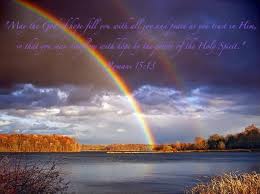A. W. Tozer Chapter Four: The Holy Trinity
 Excerpts from Chapter 4:
Excerpts from Chapter 4:
Regardless the fact that you may be a firm Trinitarian, this chapter should not be skimmed lightly.
Opening Prayer:
“God of our fathers, enthroned in light, how rich, how musical is the tongue of England! Yet when we attempt to speak forth Thy wonders, our words how poor they seem and our speech how unmelodious. When we consider the fearful mystery of Thy Triune Godhead we lay our hand upon our mouth. Before that burning bush we ask not to understand, but only that we may fitly adore Thee, One God in Persons Three. Amen.”
“Not all who called themselves Christians through the centuries were Trinitarians, but as the presence of God in the fiery pillar glowed above the camp of Israel throughout the wilderness journey, saying to all the world, “These are My people,” so belief in the Trinity has since the days of the apostles shone above the Church of the Firstborn as she journeyed down the years. Purity and power have followed this faith. Under this banner have gone forth apostles, fathers, martyrs, mystics, hymnists, reformers, revivalists, and the seal of divine approval has rested on their lives and their labors. However they may have differed on minor matters, the doctrine of the Trinity bound them together.”
Everyone who possesses the gift of faith will recognize the wisdom of those daring words of one of the early Church fathers: “I believe that Christ died for me because it is incredible; I believe that he rose from the dead because it is impossible.”
“… truth naturally follows the advent of faith, but faith comes first to the hearing ear, not to the cogitating mind. The believing man does not ponder the Word and arrive at faith by a process of reasoning, not does he seek confirmation of faith from philosophy or science. His cry is, “O earth, earth, hear the word of the Lord. Yea, let God be true, but every man a liar.” Is this to dismiss scholarship as valueless in the sphere of revealed religion? By no means. The scholar has a vitally important task to perform within a carefully prescribed precinct. His task is to guarantee the purity of the text, to get as close as possible to the Word as originally given. He may compare Scripture with Scripture until he has discovered the true meaning of the text. But right there his authority ends. He must never sit in judgment upon what is written. He dare not bring the meaning of the Word before the bar of his reason. He dare not commend or condemn the Word as reasonable or unreasonable, scientific or unscientific. After the meaning is discovered, that meaning judges him; never does he judge it.”
“The doctrine of the Trinity is truth for the heart. The spirit of man alone can enter through the veil and penetrate into that Holy of Holies. “Let me seek Thee in longing,” pleaded Anselm, “let me long for Thee in seeking; let me find Thee in love, and love Thee in finding.” Love and faith are at home in the mystery of the Godhead. Let reason kneel in reverence outside.”



Comments
Post a Comment